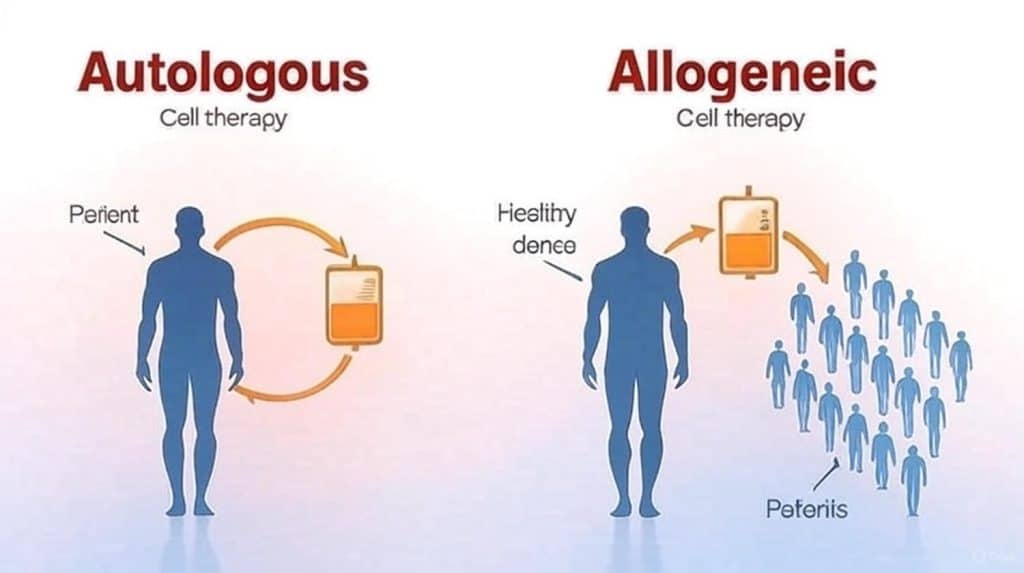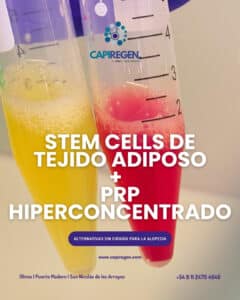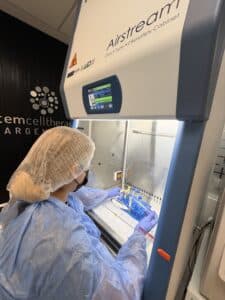Si estás considerando tratamientos de medicina regenerativa en Argentina, ya sea como paciente local o como alguien que viaja desde el extranjero en busca de opciones innovadoras, este artículo es un llamado urgente para tu seguridad y bienestar. En el mundo de las terapias con células madre, no todo lo que brilla es oro. Hoy quiero hablarte de un riesgo grave que muchos ignoran: si en alguna clínica te ofrecen células madre mesenquimales (MSC, por sus siglas en inglés) provenientes de cordón umbilical de un donante, debes retirarte inmediatamente. No es exageración; es una cuestión de ciencia y salud. Te explico por qué, basado en evidencia científica sólida.
El Peligro Oculto de las Células Madre de Donante
Las células madre mesenquimales son prometedoras para tratar una variedad de condiciones, como lesiones articulares, enfermedades autoinmunes o problemas de regeneración tisular. Sin embargo, cuando provienen de un donante (alogénicas), como las extraídas de cordón umbilical, no son tan “inofensivas” como algunos clínicos las pintan. El problema radica en la respuesta inmune de tu cuerpo.
Imagina esto: introduces células de un cordón umbilical ajeno en tu organismo con la esperanza de que se queden y reparen lo dañado. Pero, en realidad, tu sistema inmunológico las detecta como intrusas y las elimina. ¿Por qué? Porque estas células no carecen completamente de ambos antígenos HLA (antígenos leucocitarios humanos, equivalentes al MHC en modelos animales). El HLA es como una “tarjeta de identificación” que permite al cuerpo distinguir entre “propio” y “ajeno”. Si hay un desajuste (mismatch), las células donadas activan linfocitos T y B, generando una respuesta inmune que las rechaza en lugar de integrarlas.
Estudios científicos demuestran que las MSC alogénicas pueden desencadenar respuestas celulares y humorales, especialmente si hay incompatibilidad en el HLA. En entornos inflamatorios —comunes en pacientes que buscan estos tratamientos—, las células aumentan su expresión de HLA, volviéndose más visibles para el sistema inmune. Esto no solo reduce su efectividad terapéutica, sino que puede provocar reacciones adversas, como inflamación exacerbada o incluso memoria inmune que empeora con administraciones repetidas. En resumen: en vez de curar, estas células son “retiradas” por tu cuerpo, desperdiciando tiempo, dinero y, peor aún, poniendo en riesgo tu salud.
Esta advertencia no es especulativa. Se fundamenta en investigaciones como la de Cequier A y Vázquez FJ, donde se analiza la respuesta inmune sistémica contra MSC alogénicas. El estudio muestra que la incompatibilidad en el MHC (análogo al HLA humano) incrementa significativamente la proliferación de linfocitos T helpers (CD4+) y citotóxicos (CD8+), así como la secreción de IFNγ, un marcador de activación inmune. Además, factores como la inflamación o la diferenciación de las células aumentan su inmunogenicidad, desafiando la idea de que las MSC son “inmunoprivilegiadas”. Aunque el estudio se realizó en modelos equinos, los principios inmunológicos son aplicables a humanos, destacando los riesgos de usar MSC de donantes sin matching adecuado. 0
Un Llamado a la Acción para Pacientes Nacionales e Internacionales
Si eres argentino y buscas opciones locales, o si vienes de otro país atraído por precios accesibles en clínicas de Buenos Aires o Cordoba, presta atención: muchas clínicas promocionan tratamientos con MSC de cordón umbilical como “seguros y universales”. ¡No lo son! Retírate si te ofrecen esto sin un análisis personalizado de compatibilidad o sin usar tus propias células (autólogas). Opta por centros que prioricen la evidencia científica, como aquellos que usan células autólogas o con protocolos de matching HLA rigurosos.
Recuerda: tu salud no es un experimento. Investiga, consulta con expertos independientes y exige transparencia. Si has tenido experiencias similares o dudas, comparte en los comentarios —juntos podemos difundir esta alerta y proteger a más personas.
¡Cuídate y elige con sabiduría!
———————————————————————————
Alert for National and International Patients: Avoid Clinics in Argentina Offering Umbilical Cord Mesenchymal Stem Cells!
If you’re considering regenerative medicine treatments in Argentina, whether as a local patient or someone traveling from abroad in search of innovative options, this article is an urgent call for your safety and well-being. In the world of stem cell therapies, not everything that glitters is gold. Today, I want to address a serious risk that many overlook: if a clinic offers you mesenchymal stem cells (MSC, by its English acronym) from a donor’s umbilical cord, you should leave immediately. This is not an exaggeration; it’s a matter of science and health. Let me explain why, based on solid scientific evidence.
The Hidden Danger of Donor Stem Cells
Mesenchymal stem cells hold great promise for treating a variety of conditions, such as joint injuries, autoimmune diseases, or tissue regeneration issues. However, when they come from a donor (allogeneic), such as those extracted from umbilical cords, they are not as “harmless” as some clinicians portray them. The problem lies in your body’s immune response.
Imagine this: you introduce cells from someone else’s umbilical cord into your body, hoping they will stay and repair the damage. But in reality, your immune system detects them as intruders and eliminates them. Why? Because these cells do not completely lack both HLA antigens (human leukocyte antigens, equivalent to MHC in animal models). HLA acts like an “identification card” that allows the body to distinguish between “self” and “foreign.” If there’s a mismatch, the donated cells activate T and B lymphocytes, triggering an immune response that rejects them instead of integrating them.
Scientific studies show that allogeneic MSCs can trigger cellular and humoral responses, especially when there’s HLA incompatibility. In inflammatory environments—common among patients seeking these treatments—the cells increase their HLA expression, becoming more visible to the immune system. This not only reduces their therapeutic effectiveness but can also cause adverse reactions, such as exacerbated inflammation or even immune memory that worsens with repeated administrations. In short: instead of healing, these cells are “removed” by your body, wasting time, money, and, worse, putting your health at risk.
This warning is not speculative. It is grounded in research such as that by Cequier A and Vázquez FJ, which analyzes the systemic immune response against allogeneic MSCs. The study demonstrates that MHC incompatibility (analogous to human HLA) significantly increases the proliferation of helper T lymphocytes (CD4+) and cytotoxic T cells (CD8+), as well as the secretion of IFNγ, a marker of immune activation. Additionally, factors like inflammation or cell differentiation enhance their immunogenicity, challenging the notion that MSCs are “immunoprivileged.” Although the study was conducted in equine models, the immunological principles apply to humans, highlighting the risks of using donor MSCs without proper matching.
A Call to Action for National and International Patients
If you’re Argentine and looking for local options, or if you’re coming from another country attracted by affordable prices at clinics in Buenos Aires (Retiro) or Córdoba, pay attention: many clinics promote umbilical cord MSC treatments as “safe and universal.” They are not! Leave if they offer this without a personalized compatibility analysis or without using your own cells (autologous). Opt for centers that prioritize scientific evidence, such as those using autologous cells or rigorous HLA matching protocols.
Remember: your health is not an experiment. Research, consult with independent experts, and demand transparency. If you’ve had similar experiences or have doubts, share them in the comments—we can spread this alert and protect more people together.
Stay safe and choose wisely!
Note: This article is based on up-to-date scientific information and does not substitute professional medical advice. Always consult a qualified specialist.




